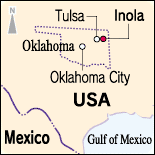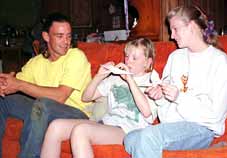April 6th, 2000
  Stacy and Shawna with Kinder, folding paper
cranes. (Inola, Oklahoma) Stacy and Shawna with Kinder, folding paper
cranes. (Inola, Oklahoma) |
| Husband not told of the danger Wife harmed through intercourse |
After a lengthy search in the driving rain, I finally found the home of Mike Stacy (32). The old sofa and ragged mat spoke of a life on the edge.
Sitting on that sofa, Mike and his wife Shawna (27) enjoyed folding paper cranes with their only child, Kinder (11), who taught them what she had learned in school.
"I wanted to keep working for my daughter's sake. But my body just couldn't take it." In a pained voice, Stacy told me why he quit his job at the post office four years ago. Since then, the family's only income is roughly $1000 in monthly disability pension from the Veterans' Administration. Mike's parents help pay their telephone and some other bills.
Inola in northeast Oklahoma has a population of less than 1500. Country born and bred, Stacy married 15-year-old Shawna two years after he graduated from high school. In April 1990, he joined the army for a four-year term to improve their standard of living and qualify for a post-service college scholarship.
However, the Gulf War destroyed all his plans. He doesn't regret serving his country. "But had I known that the army and the Veterans Administration would treat me like this after discharge, and that even my wife's health would be harmed, I would never have signed up."
Stacy served in a tank unit where his job was loading depleted uranium shells. He went into battle on February 24, 1991, the first day of the ground war against the Iraqi army. During the period when American soldiers were killed or injured by friendly fire, he was rescuing the wounded from tanks and armored vehicles destroyed by depleted uranium shells.
"I knew they were DU shells, but they never told us the radioactivity might make us sick," said Stacy angrily. Even after the cease-fire agreement on March 3, his unit remained in the contaminated desert for about two more months.
On May 8, Stacy returned to his waiting wife and child in Germany, where he was stationed. He had worn his combat fatigues and combat boots and slept in his sleeping bag for months. When he brought his personal effects home from the battlefield, he unwittingly carried radioactive substances into his home.
"After Mike got home, we all started to feel sick. Especially me..." Shawna's eyes met her husband's in what appeared to be a tacit request for approval before continuing.
"Actually, whenever we had sex, I had a terrible burning sensation in my vagina. It was like acid. Now we know that it was because his semen was contaminated with heavy metal. But we knew nothing about that until we happened to run into someone who was studying depleted uranium in 1994."
Abdominal pain, miscarriage, severe menstrual pain, headache, and other symptoms have plagued Shawna. The depleted uranium that penetrated her body gradually undermined it. Now, even the smell of perfume makes her sick, and her skin reacts strongly to the sun.
Stacy's strength is diminishing as well. Diarrhea, joint and leg pain, general fatigue. A Canadian radiation chemist has tested his urine twice, both times detecting depleted uranium. A private physician in California diagnosed heavy metal contamination based on blood testing.
The Veterans' Administration, however, accept neither of these findings. The disability pension Stacy receives is for PTSD (post-traumatic stress disorder) caused by the war.
"We don't have health insurance or savings, so we're forced to go to the VA, no matter how badly they treat us. All I want is proper treatment for us both. That's it."
The interview went on late into the night. They guided me to my car through the driving rain with a flashlight. The entreating looks I saw through the window as I drove off are still imprinted in my brain.